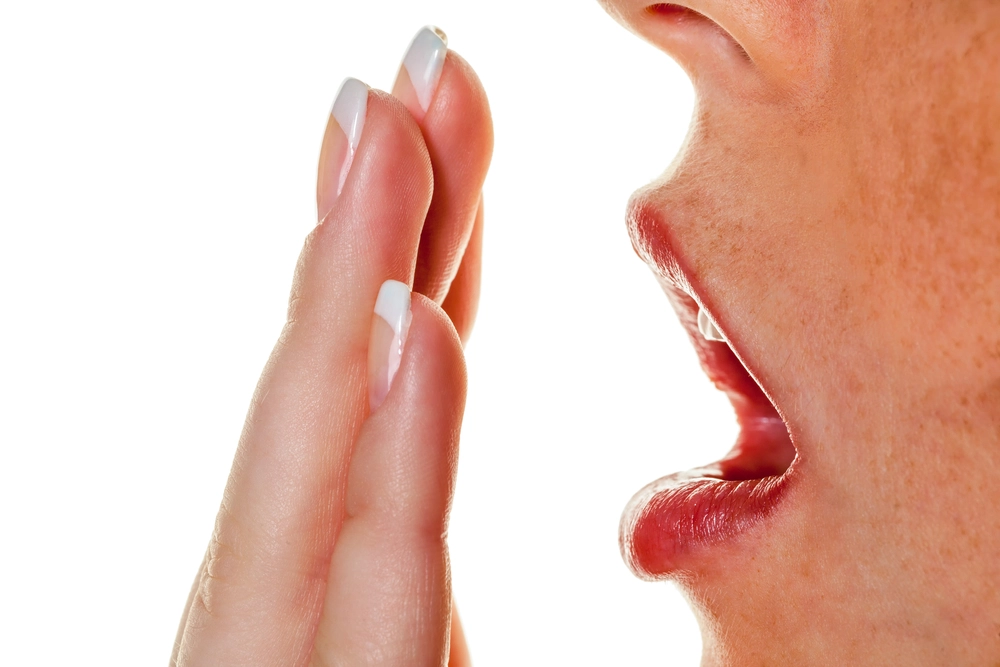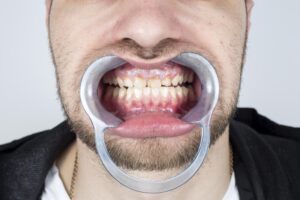
What Causes Bad Breath?: Treatment and Prevention
You’re about to go on a night out with your friends, you are looking great. Everything is perfect, you’ve brushed, flossed and also used a mouthwash for freshness. But somehow you don’t understand why there is still some bitter taste in your mouth? If this has been happening to you constantly, it could be a sign that you have a serious oral health issue.
Bad breath is inevitable. Our mouth endures a lot throughout the day. We eat, drink and take part in a variety of activities that may leave our breath unpleasant.
Almost everyone experiences bad breath once in a while. Approximately 40% of the population complains of some sort of bad breath.
Halitosis (Latin for “bad breath”) often occurs after a garlicky meal or in the morning after waking up. Other causes of temporary halitosis include some beverages (including alcoholic drinks or coffee) and tobacco smoking.
Some people may not be aware of their own halitosis and learn about it from a relative, friend or co-worker causing some degree of discomfort and distress. In severe cases, bad breath negatively impacts personal relationships and a person’s quality of life.
The good news is that there are steps we can take to help prevent embarrassing social mishaps. Sometimes a Tic-Tac just won’t do the trick, but we’re here to help!
Facts About Bad Breath:
- Covering up your mouth does not help.
- Bad breath is a very common condition in India.
- Symptoms of bad breath include unpleasant odour or taste in the mouth.
- Morning bad breath is inevitable.
- Replacing your toothbrush with a new one every two months reduces bad breath.
What Causes Bad Breath? And What Can You Do About It?
In your day to day, if you notice certain feelings or flavours in your mouth, those are good indicators of whether or not your breath smells bad. If you are experiencing any of the following, it might be time to pop a mint or brush your teeth.
Here’s some useful information regarding the nature of bad breath and how to prevent it.
- A sticky white coating on the back of your tongue.
- Plaque build-up around your teeth
- A prevalent sour, bitter or metallic taste in your mouth
- Morning breath
- Postnasal drip
Bad breath can originate both inside and outside the mouth. It is typically caused by bacteria present on the teeth and debris on the tongue. So, it’s no surprise that most cases of halitosis are associated with poor oral hygiene, gum diseases such as gingivitis (bleeding and swelling of gums) periodontitis (infection of gums and underlying bone which leads to loosening of teeth) and dry mouth (a condition in which the salivary glands cannot make enough saliva to keep your mouth moist). A visit to a dentist may help you to rule out periodontal disease and identify any oral problem that could be contributing to bad breath.
Tonsillitis, respiratory infections such as sinusitis or bronchitis, and some gastrointestinal diseases may be responsible for a small number of cases of bad breath. Advanced liver or kidney disease and uncontrolled diabetes can also lead to unpleasant breath. In these cases, a person is likely to experience significant symptoms beyond bad breath and should seek medical attention.
Here are a few causes for bad breath in your mouth and why you should see your dentist right away.
1. Oral Bacteria Build-up and Poor Oral Hygiene
Your mouth is full of naturally occurring bacteria. Bacteria love warm, wet and dark spaces. As we binge-eat on our favourite foods, the bacteria in our mouth feed on those residual particles, producing acid and leading to bad breath.
As unappetizing as this may sound, it’s a perfect natural part of the ecosystem of your mouth. Just as with your gut, your mouth is composed of good and bad bacteria that help keep your gums and teeth healthy. Problems arise when bad bacteria outnumber the good bacteria, which can cause more serious issues like gum disease and tooth decay.
This is why having a good oral hygiene routine is so important. When you fail to brush and floss your teeth, bad bacteria begin to build up, causing plaque and ultimately bad breath. Floss and brush regularly to dislodge food that will ultimately rot and really make your breath smell bad.
One of the most important reasons for bad taste in the mouth is by not having a proper dental hygiene routine. Brushing and flossing your teeth clears away oral bacteria accumulation, which cleans your teeth, prevents infections and gum disease and freshens your breath. Using an antibacterial mouthwash can also reduce any foul odour-causing bacteria from your teeth and tongue.
In addition to cleaning your teeth you also have to take care of your tongue. You need to start incorporating the use of tongue cleaner in your oral hygiene routine.
The food debris also accumulates on your tongue surface which if not cleaned or removed can be a cause for your bad breath.
In addition, having a dry mouth can cause a bitter taste due to the lack of saliva. Generally, your saliva is meant to wash away debris and minimize bacteria. Without it, your mouth has an increased risk of developing bacteria, leading to bad breath or even infection.

2. Acid Reflux
Also known as gastroesophageal reflux disease (GERD), acid reflux is when the muscle at the top of your stomach becomes too weak and allows bile to climb up into the food pipe. This can irritate your throat, leading to a burning sensation in the chest or abdomen. These symptoms can lead to a bitter or spicy taste in the mouth and cause bad breath.
Also being empty stomach for a long period of time can cause bad breath.
3. Excessive Stress
High levels of stress can activate your body’s stress responses. Sometimes this can lead to a person’s sense of taste being altered, which can follow up with dry mouth and a foul flavour.
4. Neurological Trauma
Our taste buds, like our other senses, are directly linked to the nerves in our brain. Sensing a bad taste repeatedly can be due to trauma to the nerves. Head injuries or conditions that can result in nerve damage include:
- Epilepsy
- Dementia
- Multiple Sclerosis
- Bell’s palsy
5. Certain Medications
Aside from biological sources, some medications can also be the reason for bitter taste buds. This might be either because the medicine tastes bad or its chemicals were leaked into the saliva. Medications that could lead to a foul sense of taste include:
- Particular antibiotics
- Certain cardiac drugs
- Vitamins with minerals/metals, like copper, zinc, or iron
- Lithium drugs
- Cancer treatment
It can be difficult to know how to handle a bad taste in your mouth with various sources to consider. The best way to address the issue is to visit your dentist as soon as you can, since they can help identify and treat the underlying issues.
Similarly, to alcohol and coffee, some medications can cause dry mouth. We’re definitely not advising that you stop taking your meds to combat bad breath. Just don’t be surprised when the problem arises. The effects of dry mouth are easily countered by drinking water or eating foods that aid in the production of saliva viz lime.

6. Smoking
Smoking and Tobacco stains your teeth, gives you bad breath and puts you at risk for a host of health problems. Tobacco reduces your ability to taste food and irritates gum tissues. Smoking also affects your sense of smell, smokers may not be aware of how their breath smells. Cigarettes affect the bacteria in your mouth, killing off the good bacteria and helping the bad to flourish. Smoking damages your lungs and has been proven to cause gum disease, which will definitely make your breath stink.

7. Clean Dentures
If you wear removable dentures, take them out at night, and clean them thoroughly before using them again the next morning. The food stuck under them during eating can cause bacteria to grow under the denture and cause bad breath.
8. Foods
This might seem like a no-brainer, but certain foods also cause bad breath. The first offenders that come to mind are definitely garlic and onions. These two food favourites are at the top of the halitosis hotlist because of their smelly, sulphurous attributes. Cysteine sulphide is the compound in these foods that is absorbed into your bloodstream and exuded through your lungs and pores. And while garlic and onions are tasty, they cause bad breath almost immediately and tend to stick around for a while.
Beverages like coffee or alcohol can cause bad breath, too. These liquids stifle your mouth’s natural production of saliva. Less saliva means that bacteria stay longer in the mouth to react with leftovers from the day’s meals.
9. Infection
If you’ve recently had oral surgery, your mouth is prone to infection. While your body is healing, the good bacteria in your mouth are working overtime to stay ahead of the bad kind. If you develop an infection after having a tooth removed or some other issue corrected, contact your dentist or orthodontist. They may be able to provide you with a medicated rinse, or other means by which to ward off infection.
Sinus or ear infections can also contribute to halitosis. If you are experiencing a postnasal drip for a prolonged period of time, you may notice our breath begin to take a smelly turn.

10. Disease
Sometimes an underlying disease can cause bad breath. Cancer or other metabolic issues produce bad odours due to the chemicals they produce in your body. Acid reflux, diabetic ketoacidosis, and other serious problems can also contribute to halitosis. If you have persistent bad breath that isn’t helped by typical means, be sure to see your doctor just to rule out other health concerns.
Tips to Improve Bad Breath:
Here are Some Helpful Tips to Improve Bad Breath:
- Brush your teeth at least twice a day, after meals, with a fluoridated toothpaste.
- Avoid tobacco smoking and chewing tobacco-based products.
- Rinse and gargle with an alcohol-free mouthwash before bed.
- If you have dry mouth, make sure to drink enough fluids throughout the day and use over-the-counter moisturizing agents, such as a dry mouth spray, rinses, or dry mouth moisturizing gel. If you don’t see any improvement, you may want to schedule a visit with a dentist near you. Dentists provide comprehensive care for mucosal diseases, salivary gland disorders, orofacial pain conditions, and oral complications of cancer therapies, among other things.
- Visit your dentist regularly. Remember, oral causes are responsible for most cases of bad breath!

Note: It is important to get a six-monthly dental check-up done.
To book an appointment with us in, ‘Smile Delhi – The Dental Clinic’– call us on +91-9811106871 or whatsapp Dr. Suprriya B Bhatia on +91-9811106377. You can also mail us on info@dentalclinicdelhi.com
“We Care To Make You Smile”
Posted by: Dr Hema





























































